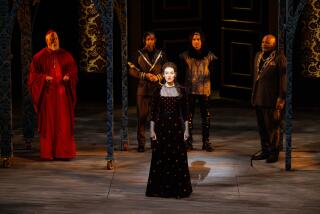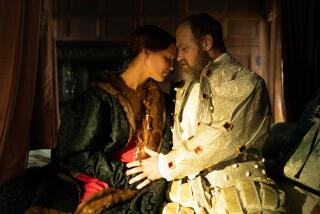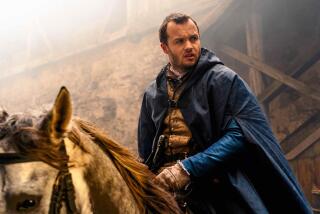Those bad, bad ‘Tudors’
Seducing another man’s wife is often risky business, but making a play for King Henry VIII’s adored teenage bride, well, that’s bound to end with both lovers’ heads on the chopping block.
That possible scenario didn’t stop Thomas Culpepper, one of the king’s grooms, who befriends and then beds the naive young Katherine Howard in the fourth and final season of Showtime’s hit costume drama “The Tudors,” which launches its last 10 episodes beginning Sunday. And that’s after he rapes a peasant woman and kills her aggrieved husband.
“He has no redeeming features at all,” series creator and writer Michael Hirst said recently from London. “Lots of other characters in the show have a dark side, but he’s a total villain, which makes him sort of enthralling.”
Though the series has had its share of virtuous characters, such as Henry’s first wife, the devout Katherine of Aragon, and beloved religious leader Sir Thomas More, it’s the sinners who have propelled much of the action and helped draw in 2.3 million viewers last season.
“It’s fun to watch people who create chaos,” Hirst said. “They’re charismatic but unstable and unpredictable.”
There’s been a veritable rogue’s gallery of schemers, liars and all-around heels in the series, including home-wrecker extraordinaire Anne Boleyn; her pimp-father Thomas Boleyn; assassin-for-hire Sir Francis Bryan; and brutal reformer Thomas Cromwell. In the upcoming season, Culpepper (played by Torrance Coombs) takes his place among the worst of the worst, as does the Earl of Surrey, who tries to overthrow King Henry. (It ends badly for him, naturally).
“Villains are always more complicated psychologically and emotionally than the good characters,” said Karen Tongson, professor of English and gender studies at USC. “You want to figure out what drives these rich and thick, gnarly personalities. They’re strangely alluring.”
On top of that list is Henry himself, played by Jonathan Rhys Meyers, who devolved during his 16th century reign into “a tyrant and a monster,” Hirst said, but one who has fascinated fans of the steamy period soap opera. It probably doesn’t hurt that this chiseled Henry, played by a two-time Golden Globe nominee, looks like he just stepped out of a designer jeans commercial. (He did).
Rhys Meyers said he sees Henry as “a very complicated and egotistical man” who slaughtered 70,000 of his own subjects, beheaded wives and executed even close friends on a whim. In the new season, he starts a war with France just because he’s having a midlife crisis, and being in battle invigorates him.
“People were disposable to him,” Rhys Meyers said. And even though the king is shown to be consumed with regret by the end of the series, “there’s no redemption for the devil,” he said.
That kind of anti-hero is right at home on Showtime, where series based on borderline or full-blown sociopaths have become the pay cable network’s bread and butter. “Weeds,” “Dexter” and “Nurse Jackie” all center on dynamic figures who are written to repulse and compel at the same time.
“Audiences have embraced these willful, flawed central characters who don’t do the right thing and don’t ask for forgiveness,” said Bob Greenblatt, Showtime’s president of entertainment. “But viewers still have to care about these characters and root for them.”
One of Hirst’s goals for “The Tudors” was to dispel some myths about such people as Boleyn and Cromwell, who have had a lot of bad press over the years. “I wanted to undermine the clichés,” Hirst said, while not overlooking the killings, betrayals, tortures and manipulations that are undeniably part of the characters’ résumés.
History provided plenty of villains from the Tudor era, Hirst said, and he used their exploits to help the series resonate with contemporary audiences, taking them “out of the museum and showing them as human beings.”
Alan Van Sprang, as Henry’s drinking buddy and mercenary Sir Francis Bryan, played the baddie with relish -- aided greatly by an eye patch -- because he saw evil as the predominant force in “The Tudors.” “You couldn’t be a hero in King Henry’s court,” he said. “If you tried, you’d be executed immediately. That would be the end of your heroism.”
Van Sprang’s Bryan was responsible for one of the most cringe-worthy scenes of Season 3, in which he purposely got the executioner drunk the night before Cromwell’s beheading. As a result, the barely standing hatchet man sawed away at Cromwell’s head until someone else had to step in to finish the job. “If people didn’t hate Sir Francis before that,” he said, “they certainly did after.”
More to Read
The complete guide to home viewing
Get Screen Gab for everything about the TV shows and streaming movies everyone’s talking about.
You may occasionally receive promotional content from the Los Angeles Times.






